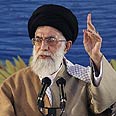
Khamenei. No insulting talkbacks
צילום: איי פי
Iran admits to blocking millions of websites
In unprecedented speech, Islamic Republic's prosecutor general says regime has censored over five million sites due to 'unethical content'; bloggers concerned over new bill that would allow execution for publishing anti-Islamic material online
Five million internet websites are currently being blocked by the Iranian government, a progressive site called 'Rooz' reported Wednesday, quoting the Islamic Republic's prosecutor general as its source.
The report added that a few million additional sites were being censored as a "preemptive measure" by the regime. The report is the first ever in which a legislative source from Iran has divulged information about the regime's censorship policies.
During a conference in the country Prosecutor General Abdolsamad Khoram Abadi explained that most of the sites were blocked because they "contained unethical content", a reference to pornography and other anti-Islamic entertainment.
Ismail Radkani, a spokesman for the company responsible for the blocking of websites in Iran, also spoke during the conference. He said over a thousand such sites were being "automatically" withdrawn from the public eye every month, according to legislature passed down from the government.
"Every day 200-300 unethical sites are being automatically blocked," he said.
Iran's population currently stands at 71 million, and the number of web-surfers, currently estimated at about 20 million, is steadily rising. The Islamic Republic ranks second only to Israel in its percentage of web-surfers of any country the Middle East.
Most of the internet-savvy Iranians have devised methods of circumventing the censorship imposed upon them, and make use of different proxies and alternate addresses when publishing their online blogs.
But the Iranian government has insisted on battling the "westernization" of its younger population, and the internet is considered a major culprit in this scheme.
Abadi estimated the internet as a more imminent danger than satellite dishes, "because of the fact that the internet is more accessible". Thus, he called for the establishment of an "internet police" in his country.
Distorting Khameini's words illegal
Two years ago President Mahmoud Ahmadinejad's government approved an "internet and blog registration plan", which ordered that every site and blog originating in the country seek an approval stamp from a nominated committee. However many bloggers decided to boycott the plan, and only 850 sites and blogs have registered.
Bloggers and sites that place "unethical content" online are subject to penalties by law. A website is deemed illegal if it contains content "weakening Islamic values, insulting the Islam and its martyrs, inciting harm to security and the interests of the Islamic Republic, or distorting the words of (Ali) Khamenei" among other things.
In February of 2008 the Iranian parliament approved part of another bill against "computer crimes", which has caused a great uprising among web-surfers because of the severe sentences it would impose, ranging from jail time to execution.










